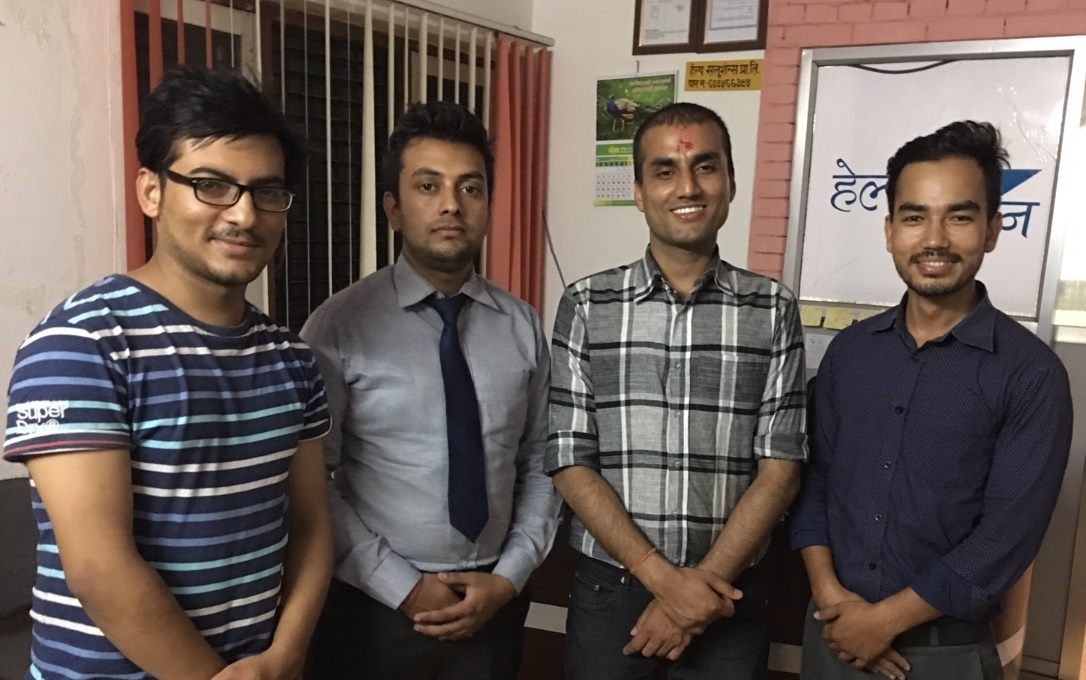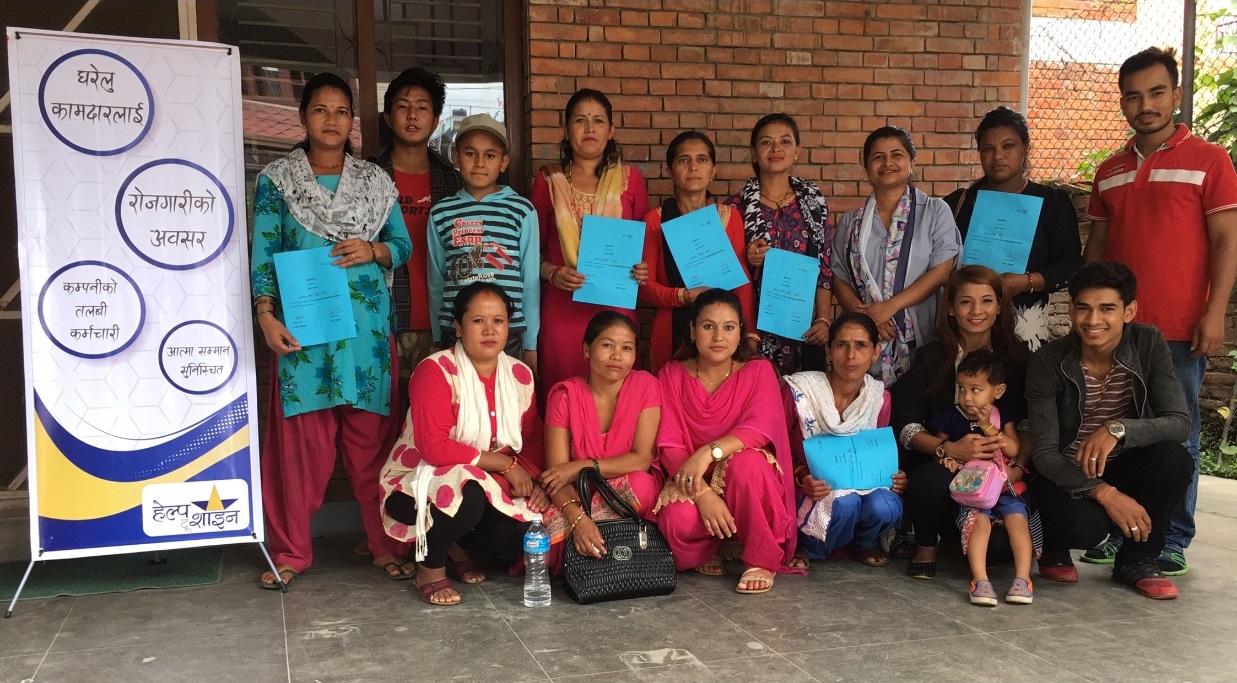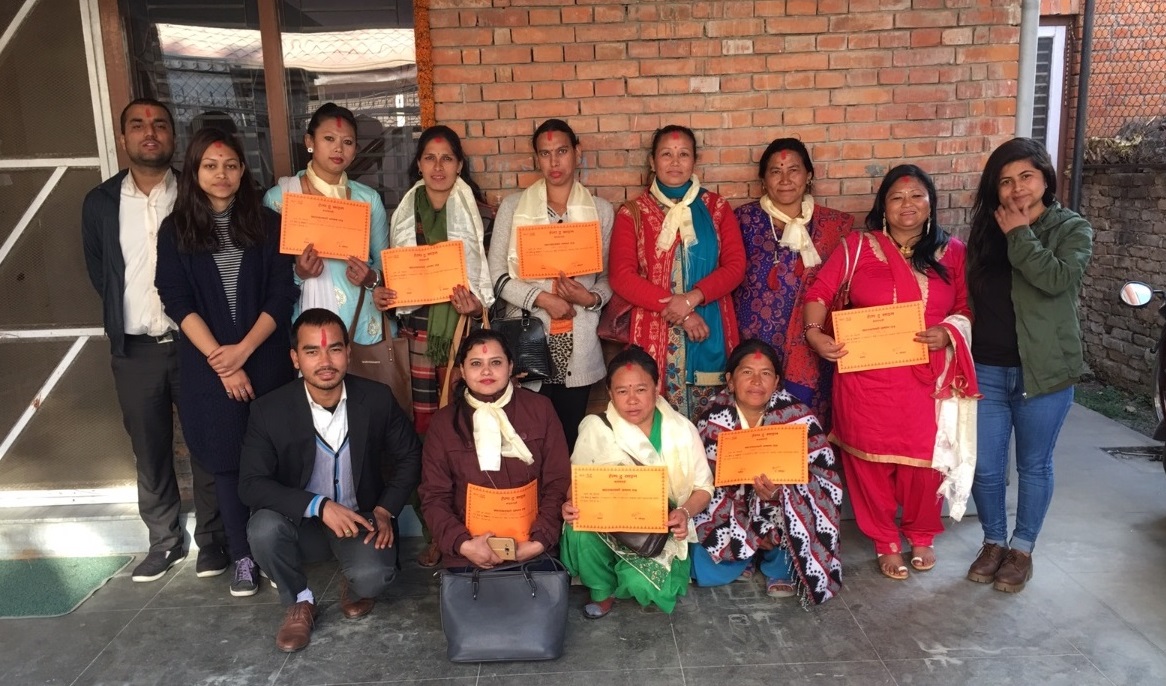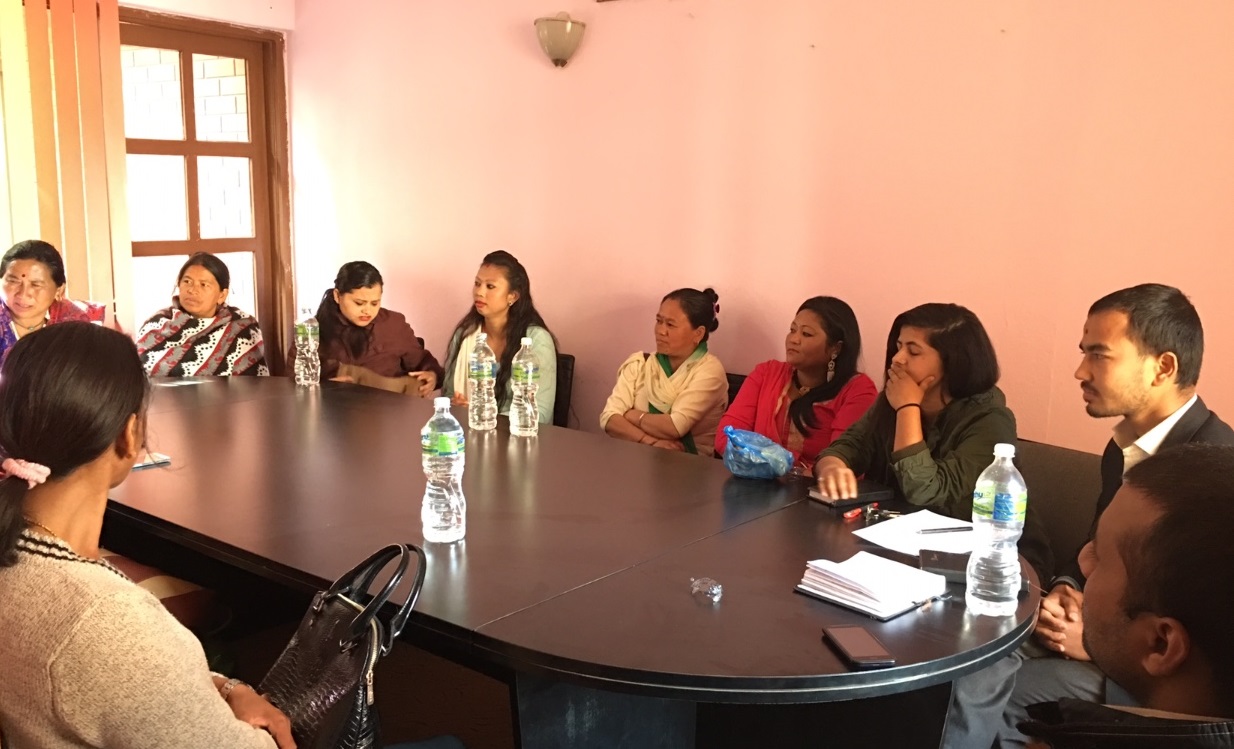SOCIAL ENTREPRENEURSHIP BLOG SERIES ISSUE NO. 14: Creating A Sense of Belonging Through Service; The Story of Help2Shine
How do you imagine a boy who has just completed a MBA? Maybe someone who is searching for a job or working somewhere. But Prakash Basnet has a different story to tell. A recent MBA graduate from Kings College, he is the CEO of a company that is providing direct employment to more than 600 domestic workers. He started his company named ‘Help2Shine’ in July 2016 and now has established himself as one of the youngest successful social entrepreneurs in the town. Read his story through this interview done by Bikas Udhyami on his journey from a student to successful entrepreneur.
How did Help2Shine start?
It was 2016 July when started as one of the brands of Help Solutions Pvt. Ltd, which had registered in 2015 December. We did some logistics work at the beginning and meanwhile saw a huge gap in the market. Women who work at home were not getting any respect. Their dignity was not prioritized. The problem was with clients as well. They were not getting any reliable source from where they can hire someone for domestic work. We saw an opportunity there. And I thought it could have huge social impact.
You were doing MBA at that time. There are many youths who are doing the same but most of them don’t have any idea of what they do further. How were you able to find your career path?
We are 4 co-founders. Bikash Neupane, Kismat Pandey, Bhisan Raj K.C and me. Talking about how we found gap in the market, we used to sit and discuss with our friend circles. We wanted to do something new that could solve a problem. We had this idea since a very long time, but didn’t know how to execute it properly. After sharing the idea with friends, they used to warn us not to work on it further because this is such a low-level type of business to be done by a MBA graduate. The thing that inspired me the most was seeing my neighbours treating their domestic workers badly. I used to wonder what the reason was for them to not be treated well. As I said earlier, there were very few, who were giving that dignity, respect and pay scale to their workers that they deserved. That inspired me advance my idea. We talked to some mentors. Then we knew that this business was already attempted by many people, but failed miserably. That was the huge challenge, because it was already an unsuccessful business model.What you did to make yourself unique and do something different to sustain well?

Before starting the business, we evaluated all the previously failed business models. We found that they approached both landlords and domestic workers, we are doing the same here. But where they failed was that they immediately sent workers to home without enrolling them in their own system and standard rules of the company. That made them just a matchmaker and so they became only on the second choice of both landlords and workers. We do the same thing, but before matchmaking, we enroll them in our system. We appraise what their interests are and where they can fit best. If they need skills, we provide them. We measure the amount of their workload and estimate the wage accordingly. We in that way have standardized the service so that the expectations of both ends meet. We tried to be the primary choice on this field. We at first researched on whether we as a company are required at the current time or not. We did pilot testing in Buddhanagar and the response was amazing. We found that the major expectation on both sides related to the time schedule. Domestic helpers had no holidays. They were paid less than promised. We addressed this and developed our system. We try to spread a feeling of belonging among service providers and service takers.
You talked earlier that already started businesses couldn’t build the primary trust. For a social enterprise, why gaining the trust is necessary?
The main motive of our business is to foster trust. We are trying to create an environment where trust is the major priority, because a business runs only when we trust. A person invites an unknown worker in their home and gives the entire key. They trust an agency like us for this. If we could not guarantee that the person we send is reliable, we cannot sustain. For that reason, we have to build our foundation on the legal ground that bounds us, service giver, and service takers together.
Through which process you enrol the workers?
We mainly target women domestic workers who are working elsewhere in the city. They have their job through informal channel. We try to incorporate them in our formal system so that we know what their strengths are and where we can fit them best. We try to give them best option available. To work with us, there are certain criteria. The first thing is that, our employees should be above 20 years with a citizenship. They should have minimum job knowledge, if they haven’t, we render them certain skills. Then the office decides where to send them according to their skills and expertise.
You had already started this business before completing your MBA. You must have done various project works on MBA and BBA itself. What are the things in your views are important to evolve from a project work to a successful entrepreneur?
A lot depends on which environment you are studying. Had I not been studying at Kings College, I would not be leading this business right now. I got opportunities to nurture my knowledge there. I had an idea and I find a suitable environment to flourish through the incubation process. I even got the seed money of $ 1500 for my early investment. That encouraged me to trust on my business model and its viability. I believe that earning while studying is a good idea. It keeps you on your feet and prepares for the future steps. If you have a good idea for your project work, it is not like that you should do that immediately. You can keep that with you and study further to accomplish it later. Talking to mentors is important to improve your idea and keep working on it. ‘I am not ready so I won’t start’ is never a good excuse.
What were the early hardships? How did you overcome these?
The first difficulty came at the very beginning, because we were working on an already tried and failed business model. Finding out the answer to the question whether we should do it or whether we should not do it was the major challenge. After starting the company, we faced a severe challenge in the first six months. The first thing was that no one was ready to work with us. They used to ask why they need to go to our office if they are getting enough work through personal contacts. Clients were not believing in us, because we were new and some of them had already had bad experiences due to the failure of previous companies in this field. We kept trying and continued reaching out to multiple people. We had the bitter experience that people were not even ready to register their name with us. Some of the workers we approached used to smile at us when we said we would give the job to them.
I want to share an incident. When we were just started, one uncle from Buddhagar came and asked for one worker. At that time, we had hardly 8-10 registered sisters in our database. He paid us Rs. 8,000 in advance and requested to send one the next day. We confirmed a sister, persuaded her to go but she didn’t appear to his house in the next day. We tried some others but got the same results. Then we went to his house and returned our first income cheque.
Then we didn’t take money in advance from the second client. We first sent the worker. That worked. We received our first income. And after one year, we are providing service to our first client, whose money we returned earlier. We have now 1600 listed names and around 600 plus are working with us.
How do you earn? What is your business model?
We mainly provide four kinds of services available. They are domestic service, babysitting, caregiving and postnatal care. We have fixed the salary of the workers who go through us accordingly. They get that salary according to the nature and skills involved in their work. We charge a certain amount from the client for doing that. If they pay that for once, we give them service for one month. Another package is client directly pays the company and we decide the salary to be given to them.
How does one have to pay if they want to keep a worker in their house?
It starts from 3500 per month, but that depends on the kind of service as well. For a home, the general fee is 3500, for babysitting it starts at around 10,000, if caregiver it starts from 12,000 and if postnatal care it begins from 17,000. Our main core focus is domestic workers. If the costumer directly pays the salary to them, for 8 hours per day, they get minimum 10,000 per month. This is for the full-time provision. If they work for 2 hours per day, they get 35,00 per month.
But if the costumers pay all the amount to our office, we pay them 9,700 per for full time after deducting the tax. The benefit for them is, they have company benefits like leaves incorporated in this system.
What are the impacts do you think Help2Shine is having on society?
Social enterprise is a calling for me. I want to share a story. We have one worker named Yesodha Giri. She is working in Handigaun now. There is one madam living in a home alone. Her children are out of the country. Her foot doesn’t work properly and she has to go to the hospital in Thailand on the regular basis. We placed Yesodha didi there before 6 months. When I called the madam after sending Yesodha didi to get her feedback, she said she found a new daughter. Then I called Yesodha didi who cried at first and thanked me for sending her to homelike home. She said she would never want to leave this house in which she works, because she got new parents.
I think this story is sufficient to tell you that we not only are providing not only service, we also spread human belongingness. Through the medium of professional trust, we are joining the emotions together. Those women who used to earn a limited amount from a single house, we have given them multiple options to earn from. This has increased their income and given them better livelihood option. They are providing education to their children. And especially women are being able to do family decisions because of their economic independence. Those who didn’t have holidays, have these now. Those who didn’t have respect and dignity in the place they worked, now work in a professional working environment. We are creating such stories together.
Those who are working with us, they are not giving their full time. They are free to work elsewhere before or after giving time to us. This helps them to gain extra earning through extra employment according to their time schedule. They should not have to leave their job to work with us. All they have to do is fix the time when they want to go through us. If they are working outside happily, which many of them are doing, our platform functions as extra earning platform.
What are your further plans in this field?
People generally see us as a matchmaking business, but we are more than that. There are lots of areas to work on. We have to simplify the service. Now clients have to visit us in person and we have to send the workers in person. We want to simplify this. There are multiple expectations for this level of business and we have to meet that as well. We are sustained now, so I think it’s time to make our services more simple, familiar, and create a welfare environment for those all who contributed to lifting us here and those who will be joining us in the days to come.
Still, there are perceptions that agencies are there to fraud. We need to prove those wrong and be the example or footmark that future entrepreneurs could learn from. We have to continue doing this. I think we will now be more focused on service and process innovation. We are also expanding our offices within Kathmandu valley soon.
What suggestions do you want to give to future aspiring social entrepreneurs?
After MBA, expectation rises. Society and family will try to pressure you up to do something. Real life is very different than we read in the classes. If you have a dream to start your own business somewhere in the future then you must target working in start-ups rather than other bigger companies. What I am saying is that start-ups offer you better learning opportunities. You will not bound to certain departments. You will know how to struggle in crisis, overcome the challenges, do decision making at a strategic level and to build the system as well. Start-ups teach micro- management practically.
What do you want to say to those who used to laugh at you for choosing such a low standard type of business?
What I say is work is never small or big. What matters is the impact that you can achieve with you work for society. Looking for a cause and purpose is important. I am not negative towards the people who used to say these things. Maybe I could not persuade them of what I was doing. Now I am proving them the scope of it. Now they believe. I think we should not be demotivated after listening to what people say to us rather we should go on to prove what we see.
Facebook: https://www.facebook.com/help2shine/



